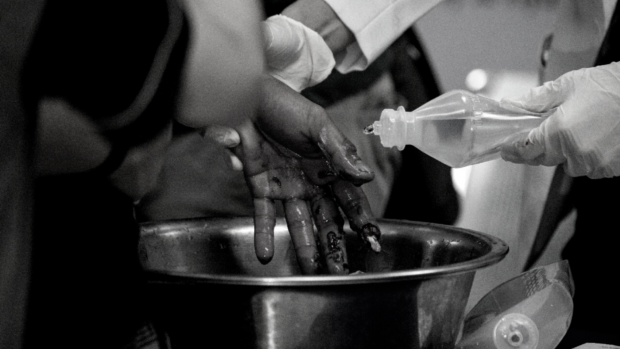DOH notes ‘passive victims’ among firecracker injury cases

A person injured by firecrackers is cared for at the Jose Reyes Memorial Medical Center in Manila early on Jan. 1, 2019, after New Year’s celebrations. (Photo from Agence France-Presse)
MANILA, Philippines — On top of the rising number of firecracker injuries, the Department of Health (DOH) also made an alarming observation, particularly when new cases were reported on Saturday: They involved more “passive victims.”
These are people who were injured by the explosion of a firecracker lit by someone else.
Of the 11 new injuries reported by the DOH on Saturday, six — or 55 percent — were passive victims.
They included a 72-year-old man in Metro Manila who suffered burns and abrasions from an exploding “kwitis,” or so-called skyrocket, in the street. He is the oldest victim of firecracker injuries so far this year, according to the DOH.
Another victim, a 19-year-old man from Cagayan Valley, was forced to have his left hand amputated after being disfigured by an exploding “pla-pla,” one of the powerful firecrackers that are banned.
Article continues after this advertisementNo one spared
“The trends in data are clear and consistent: fireworks-related injuries happen at home or nearby, involving mostly young boys but also affecting passive onlookers of any age or sex,” the DOH said. “(They) spare no one: young or old, male or female, active or passive in involvement.”
Article continues after this advertisement“Watching community fireworks displays from a safe distance is still the best. Parents and community leaders are key,” it added.
As of Dec. 30, the department has tallied 107 firecracker injuries nationwide, with 38 percent of the cases in Metro Manila (41 cases), 11 percent in the Ilocos region (12), and another 11 percent in Central Luzon (12). The rest of the cases were in Soccsksargen (7), Cagayan Valley (5), Bicol (5), Calabarzon (5) and Western Visayas (5).
Prices down in Bocaue
Meanwhile, two days before the New Year’s revelry, the town of Bocaue, Bulacan — the country’s “fireworks capital” — saw a stream of buyers taking advantage of the cheaper prices for pyrotechnics.
Nelson Managuelod, 55, who came from Angadanan, Isabela, stopped at one of the stalls and bought P1,500 worth of pyrotechnics for his grandchildren in Manila. “It is already our tradition … even though prices of basic commodities are high. This is our way of joyfully welcoming the New Year,” he told the Inquirer in an interview.
More buyers came from Metro Manila and Laguna, Batangas, Quezon, Cavite, Ilocos, and Pangasinan.
Lea Alapide, president of Philippine Pyrotechnic Manufacturers and Dealers Inc., said that compared to last year, there was enough supply of chemicals and other materials needed for production this year, hence the high volume of products available.
Magnolia Farinas, owner of MS Farinas fireworks stall in the Turo Pyro Zone area, said there was even an “oversupply” this year, with the entry of raw materials no longer hampered by restrictions imposed during the pandemic.
This brought prices down: for regular aerial shots pyrotechnic, or “pailaw,” the prices dropped to its 2021 level of P1,300-1,500 from P2,500-P3,000 last year. Sixteen-shot aerial fireworks, priced at P3,500 last year, are now sold at P1,500. Kwitis, which cost P12 apiece last year, is now just P6 each; From P1,000 last year, the 1,000-round “sawa” is priced at only P550 now, while the 10,000-round variety that costs P10,000 last year is down to P5,000.
READ: Fireworks-related injuries reach 107 a day before New Year’s Eve
READ: Groups warn public: Firecrackers traumatize pets, bad for environment
READ: Ditch toxic fireworks and firecrackers, prioritize health — EcoWaste
Look for ‘PS’ mark
Joven Ong, president of the Philippine Fireworks Association and president and chief executive officer of Dragon Fireworks, reminded the public not to patronize illegal firecrackers and look only for products with the Philippine Standard (PS) mark, which is given to brands long-known for strict quality controls.
According to Alapide, the law regulating the fireworks and firecracker industry — Republic Act No. 7183 — prohibits overweight or oversized products. Their explosive chemical content, for example, should not exceed 0.2 grams.
Buyers should be wary of unlabeled products or imported firecrackers and pyrotechnic products that contain fuel and oxidizing agents, Alapide stressed.
Bulacan Gov. Daniel Fernando, who also chairs the Provincial Pyrotechnics Board, earlier ordered barangay officials to inspect residential areas for illegal firecracker workshops.